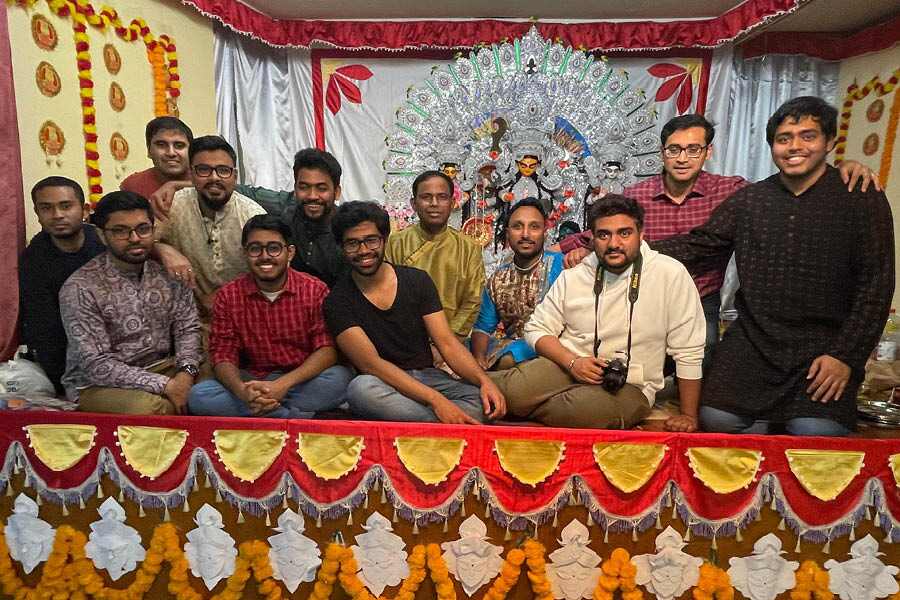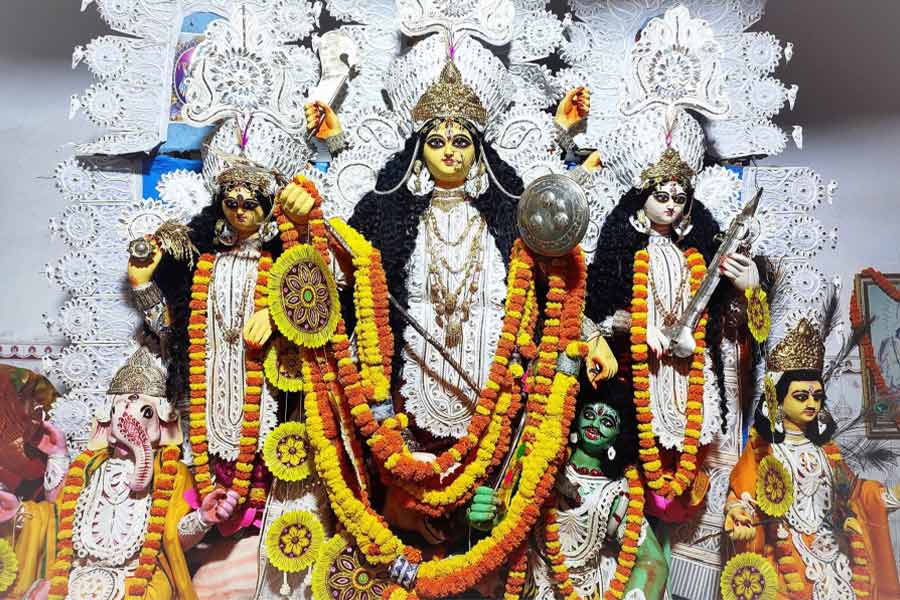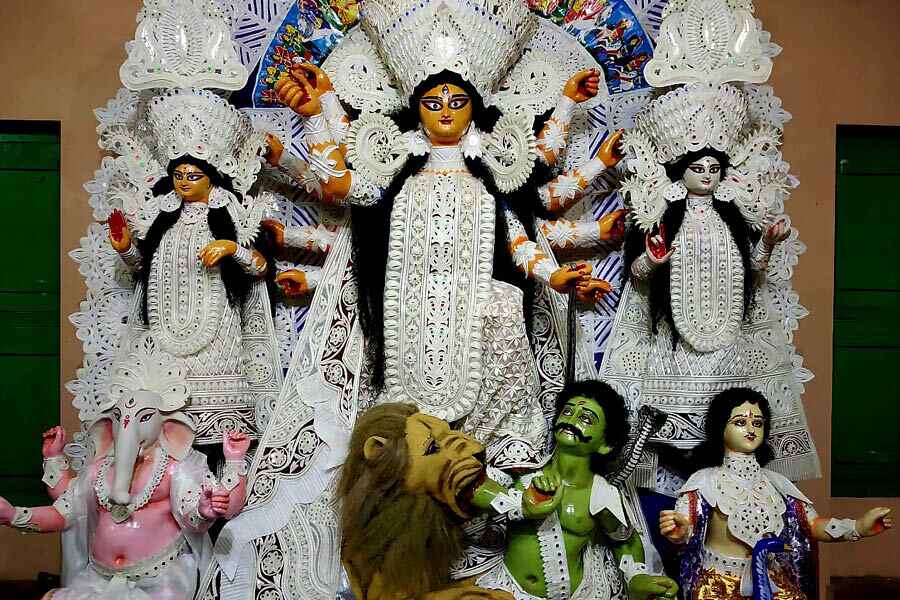It all started in 2019 when three Bengali families in Erlangen, Germany, came together to organise a Durga Puja, unable to return home to celebrate the festival they hold dearest. While some materials are still sourced from India, this year’s Puja in Erlangen has a different feel — where the celebrations are important, but so are other meaningful issues.
My Kolkata got in touch with the Probashi community in Erlangen, speaking with key individuals who have made the Puja a grand success. We found out what sets this year’s Puja apart from the past three years and how Erlangen is set to host the first theme-based Puja abroad.
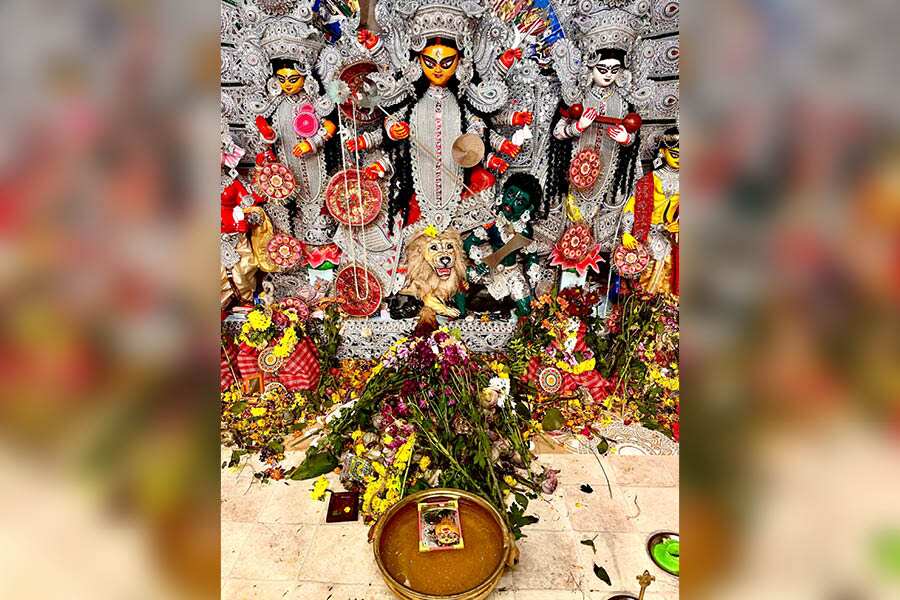
Dipankar Sarkar, who crafted the Durgaville idol last year, touched it up to look as good as new for this year’s celebration
While the idol remains the same as last year with a few touch-ups, Dipankar Sarkar, a 39-year-old IT professional and one of the co-founders of Durgaville, who also sculpted their idol, explained, “It’s very difficult to build an idol of this size every year here in Germany with limited resources. This year, we had to completely repair and redo the chaali, as it was significantly damaged last year. We also touched up the idol in several places, adjusting the daaker saaj to ensure everything looks brand new again.”
“We started on a very high note with tons of ideas pouring in on how to create the first-ever theme Puja on foreign soil. The sad incident that took place at RG Kar in Kolkata last August had a devastating impact on our morale this Puja, so we’re keeping it much more low-key than we had originally planned,” Dipankar added.
During a video call with Gargi Bhattacharyya, another founder, we learnt that Durgaville has been included in Vielfalt Indiens, a year-long celebration of Indian culture in Germany. Gargi, 40, said, “This year, we are going with the theme of a Rajbari. You can transport things on open trucks in Kolkata, which isn’t possible here. Since several of our active participants are engineers, a great deal of work went into creating movable pieces of the Rajbari, which are easy to transport, install and dismantle without much hassle.”
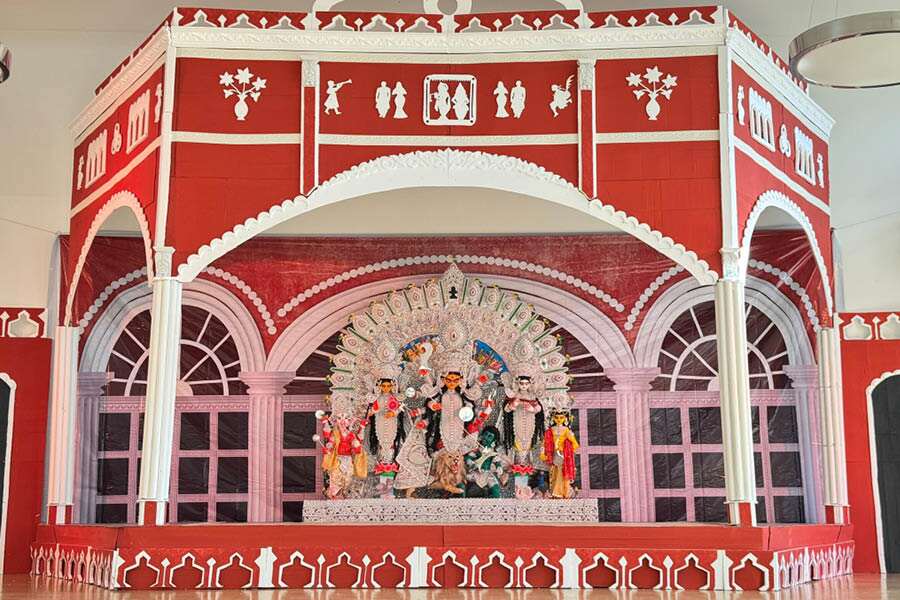
Durgaville became the first Puja outside India to have a theme with a Rajbari design crafted by the engineers after meticulous planning
When quizzed on how the Germans have reacted to the Pujo setup and whether they are interested at all, Gargi replied, “I have so many German friends who eagerly wait for our Puja to happen. They come and sit through all five days, observing everything and trying to figure out what’s happening. They love the food as well, including the labda. I even bought a readymade sari for one of my friends here, so she wouldn’t struggle to drape it.”
When asked how the idol is kept safe, since the same one has been used since last year, Gargi said, “I have a room in my house where it’s kept. That room is now completely dedicated to storing Pujo-related items. We can’t perform the visarjan here, so we have to store it in a cool, dry place.”
Gargi also mentioned that most of the items are now sourced locally, thanks to the support of the Indian community. However, she added, “The main pujo-related items that we don’t get here still have to be sourced. Our purohit usually arrives on Panchami or a day before and brings the 108 lotuses required for Sandhi Puja, which we don’t get in Germany."
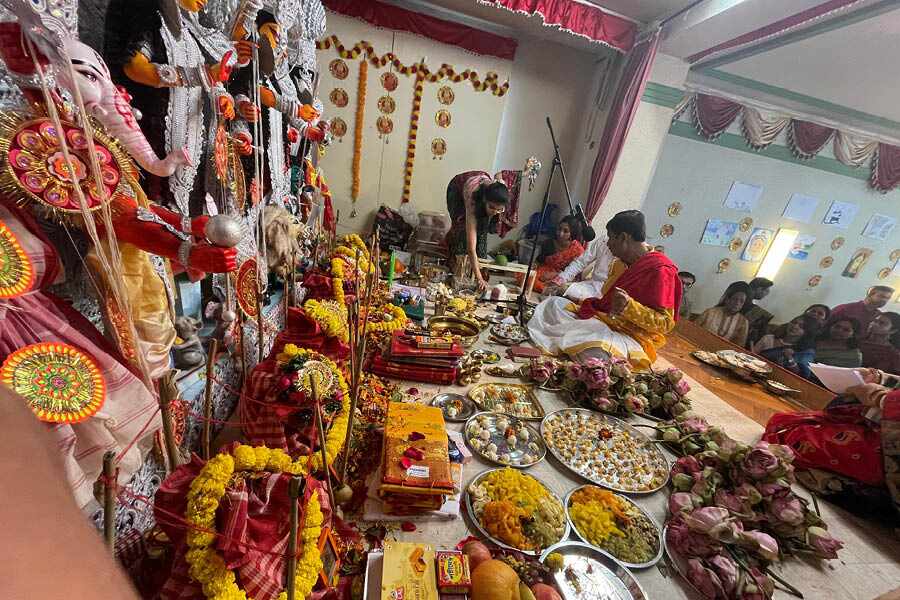
The Purohit travels from India with several puja related items including the 108 lotus flowers which cannot be sourced locally in Germany
Somenath Rakshit, another founder and a 41-year-old IT professional, who handles the Sharodiya magazine for Durgaville, said, “Literature and art, as always, serve as mirrors to the socio-economic landscape of our times. In this year’s edition of our magazine, Sharodiya, you’ll find reflections on the current realities shaping not just our state but the country at large. Through these pieces, we attempt to capture the pulse of the nation.”
When asked, Shatrughna Sinha, the Consul General of India, said, “Durga Puja has been recognised by UNESCO as an Intangible Cultural Heritage of Humanity. The efforts by Durgaville to preserve the rich Indian tradition of Durga Puja and showcase various cultural aspects in Germany are much appreciated. This will further strengthen our people-to-people bonds and contribute to enhancing India-Germany cultural ties.”
One of this year’s new features for Durgaville is the launch of their official website. Zubayr Khalid, 29, who is a software developer said, “We have launched a website this year to keep the community informed about upcoming events. Additionally, the website serves as a platform to register for various competitions and submit creative works for our annual magazine.”
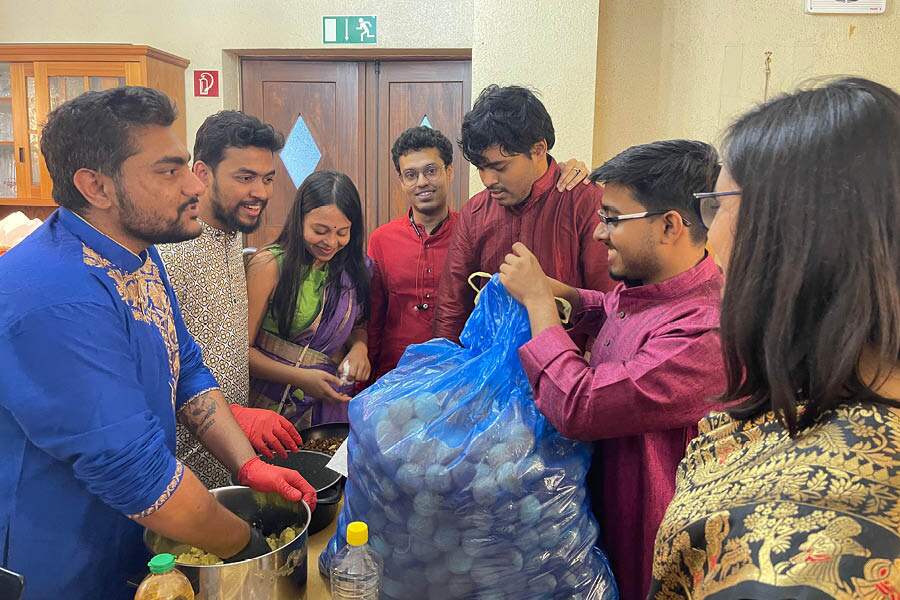
The student community is a massive part of Durgaville’s success every year
With social media being a key tool for keeping people informed, Khabbab Zakaria, a 29-year-old IT professional, said, “Durgaville actively connects with people through various social media platforms like Facebook and Instagram, where we share updates on upcoming events and post content such as photos and videos of our meetups and gatherings.”
Another IT professional in Erlangen, 30-year-old Sucharita Mallick, who is working on the cultural aspect of Durgaville, said, “Through our cultural events this year, we aim to showcase our customs, traditions, arts and values. Activities like candle lighting, kids’ drawing competitions, conch playing and quizzes are all part of it.”
Suparna Show, a 35-year-old teacher, revealed that this Pujo would have a special event, “On Navami evening, we are organising, She-Shakti: A Cultural Programme, dedicated to women empowerment, featuring classical and folk dances, along with songs honouring Maa Durga and the strength of all women.”
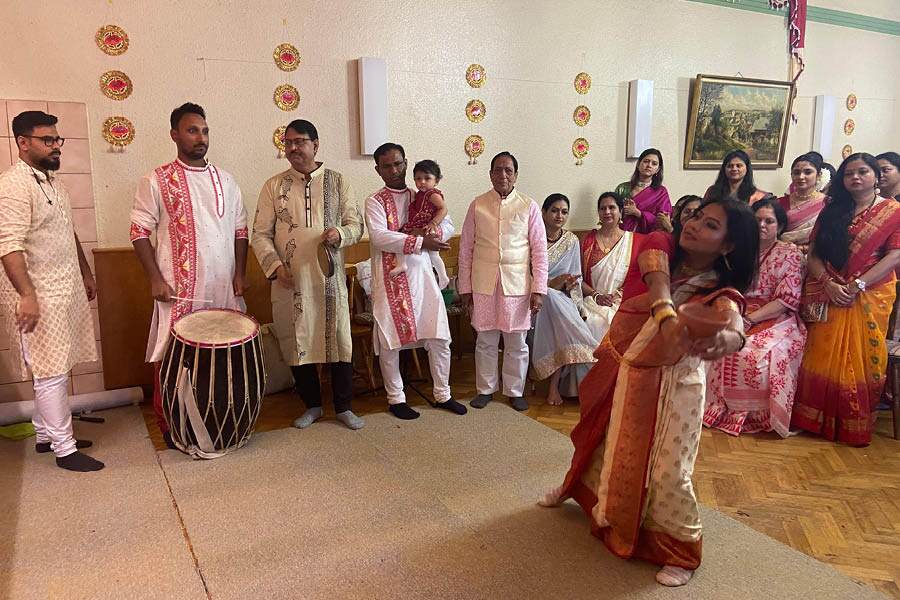
From playing the 'dhaak' to 'dhunuchi naach', the Puja in Erlangen gives everyone a homely feel
One of the biggest tasks for Durgaville this year was setting up the Rajbari theme they had decided upon. A significant portion of the Puja work is organised by the Indian student community. Badhan Kumar Das, a 32-year-old PhD student, said about the idea, “We wanted to recreate the charm of a theme-based Puja, much like we do in Kolkata. Our mandap is inspired by a traditional ‘Raj Bari’, bringing a regal ambiance to the setting.”
Meanwhile, 38-year-old PhD student Anindya Ghosh added, “The Puja premises have been decorated to showcase the rich diversity of Indian art and culture through vivid illustrations that highlight India's languages, dance forms, food, art, architecture, tourism and festivals.”
This year, Durgaville’s Puja is being held at Gemeindezentrum Frauenaurch, the largest hall in Erlangen. One of the major highlights is the incredible turnout and the number of people they fed this year. It's worth noting that Durgaville does not require any membership or fees for participation; there are absolutely no charges for entry or food. Operating entirely on a voluntary basis, the Puja is made possible through the active participation and contributions of not only the Bengali community but also the entire Indian community, primarily consisting of students and working professionals in Erlangen.
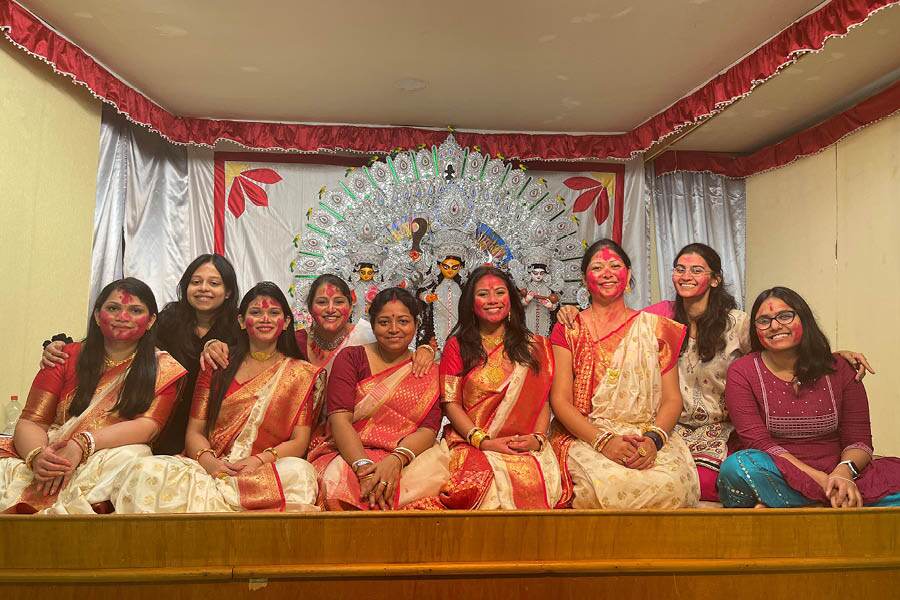
While they cannot perform Visarjan, the ladies of Durgaville still take part in Sindoor Khela, another aspect that makes this Puja-away-from-home feel like home
Debarchan Chatterjee, a 30-year-old data analyst, shared, “This year’s bhog at Durgaville is special. We will honour Maa Durga by serving meals to anywhere between 1,000 and 1,200 guests over five days. Our menu includes Bengali dishes like matar paneer, khichudi, labda, chutney, payesh, basanti pulao, Kashmiri aloor dum and traditional Indian sweets, reflecting our deep devotion and gratitude.”
Speaking further about how the ingredients are sourced, Debarchan noted, “All the ingredients have been sourced locally in Erlangen, thanks to the generosity of the Indian community here, which allows us to prepare these dishes with care. Our humble service not only honours the traditions of Durga Puja but also fosters unity within our community.”
What began as a small gathering of three families, expecting around 200 visitors, has now blossomed into a puja tradition that’s growing year after year. Durgaville has welcomed approximately 2,000 attendees this time. Gargi remarked, “We didn’t expect such a response, but the interest from the non-Bengali Indian community has been a tremendous boost for us. This has evolved into much more than just a Bengali Puja; it has become a significant part of community bonding in Erlangen, making it a great success.”
